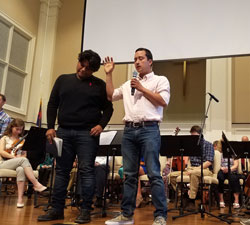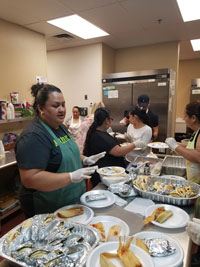VERSAILLES—For years, Versailles Baptist Church in Woodford County has been supporting their Hispanic ministry, led by Emilo and Mirma Zapata. But in the last few years, it has taken off. And they’ve decided that instead of incorporating as a separate church, they’d become one congregation in every way possible.
The approach has been working, because in the last 12 months, 20 people with Hispanic backgrounds have been baptized and 32 have joined.
“An integrative, multicultural approach is possible, even when you speak different languages,” Michael Cabell, Versailles senior pastor, said. “The mindset is normally that you go plant a Spanish speaking church. Instead, we’ve said, let’s make our church multi-lingual. Within that, that has brought so much strength, and our church has just embraced that thoroughly.”

For their annual “One” service, both congregations come together for bilingual worship.
Each Sunday morning, two worship serviced are held in the same building—one in Spanish and the other in English. Both congregations are Versailles Baptist Church. But the children’s ministry and youth group are fully integrated.
Kevin Hash, Versailles’ youth pastor, sees that this approach helps not only his church’s teenagers, but his own children as well.
“My kids are better Christ-followers because they know kids from other backgrounds,” Hash said. “These relationships are about helping us to be more like Jesus Christ. And we can’t be more like Jesus Christ if we’re only around people who think, and act, and look, and speak exactly the way we do.”
As a youth pastor, he is intentional about seeing kids discipled, and one way he found to do that was by partnering with the already existing tutoring program and encouraging the kids who attend to come to church as well. From this, he’s seen a lot of fruit recently, he said.
Additionally, once a year, both congregations come together for their “One” service, where Pastors Zapata and Cabell both preach, songs are in both languages, and testimonies are given in both languages.

Members of the Versailles Baptist Church Hispanic congregation held a food fundraiser to provide scholarships for students in both congregations.
“That just creates a little piece of heaven to hear multiple languages and people from 10 to 12 countries worshipping together,” Cabell said.
At the church’s most recent bilingual service, Rosa gave her testimony. She was thankful for the ministry to her children, because, through it, she came to know the Lord.
“In her testimony, she said, on top of all these crazy things happening to her life and marriage, she was suicidal. When she was at her lowest point, her elementary school son and daughter came to her with things that they had learned in church and at tutoring, telling her to have faith in God, believe in God, and God will take care of (them),” Hash shared.
He recounted, “She said that’s why she didn’t kill herself. She gave that testimony in front of 500 people through a translator.”
Although the ministry is thriving now, it hasn’t always, Hash recounted.
It took the Zapata’s, who also hold Hispanic services partnering with churches in neighboring Jessamine County, working “in a lot of messy relationships for years, being faithful without much numerical fruit,” he said.
Hash added, “And now in the last couple years, it’s all starting to blossom. And they’re so very passionate.”
“It has given us a picture of the power of the Gospel. It’s not just white, middle-class folks, but it’s refugees from Columbia. It’s people seeking asylum from Venezuela. It’s people wanting a new life from Mexico,” Cabell said.
Not only has this model of church given his congregation “a bigger picture of the Gospel,” but it’s helped them “see people as people, particularly when it comes to immigration issues, although, he added, “there are political issues at bay,” still.
“Both churches have mutually blessed one another because of the faith that we see, that the Gospel transcends culture,” he added. “When multiple languages and ethnic groups make up the church, it reminds us of how big the Gospel is. The Gospel is for everyone. It has given us a picture of God’s grand design.” (WR)
Myriah Snyder